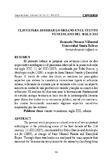Mostrar el registro sencillo del ítem
Claves para entender lo urbano en el cuento venezolano del siglo XXI
| dc.rights.license | http://creativecommons.org/licenses/by-nc-sa/3.0/ve/ | |
| dc.contributor.author | Navarro, Bernardo | |
| dc.date.accessioned | 2015-11-25T09:06:52Z | |
| dc.date.available | 2015-11-25T09:06:52Z | |
| dc.date.issued | 2015-11-25T09:06:52Z | |
| dc.identifier.issn | 1315-9435 | |
| dc.identifier.uri | http://www.saber.ula.ve/handle/123456789/41159 | |
| dc.description.abstract | El presente trabajo se propone una revisión crítica de dos importantes antologías en el panorama editorial de la primera década del siglo XXI: 21 del XXI (2007), coordinada por Rubí Guerra, y Antología sin fin (2009), a cargo de Juan Manuel Parada y Dannybal Reyes. A través de estos dos libros se analizan los principales aspectos que rodean la cuentística venezolana ligada al referente urbano, aclarando de entrada que se entiende este como un aspecto inscrito en medio de una producción variada y amplia en cuanto a los referentes. El análisis del discurso será la herramienta fundamental de estudio, aunque también se hace uso de la historiografía literaria para ubicar los textos en un escenario político, social y económico, los cuales terminando marcando algunos aspectos narrativos empleados por los autores. | es_VE |
| dc.rights | info:eu-repo/semantics/openAccess | |
| dc.subject | Cuento Venezolano | es_VE |
| dc.subject | Siglo XXI | es_VE |
| dc.subject | Urbano | es_VE |
| dc.title | Claves para entender lo urbano en el cuento venezolano del siglo XXI | es_VE |
| dc.title.alternative | Keys to understand the urban in the Venezuelan story of the 21st century | es_VE |
| dc.type | info:eu-repo/semantics/article | |
| dc.description.abstract1 | The present work proposes a critical review of two important anthologies in the publishing scene of the first decade of the 21st century: 21 XXI (2007), coordinated by Ruby Guerra and Antología sin fin (2009), in charge of Juan Manuel Parada and Dannybal Reyes. Through these two books are analyzed the main aspects that surround the Venezuelan story linked to the urban by clarifying from the beginning that refers this to an aspect entered in the middle of a wide and varied production in terms of references. The analysis of the speech will be the essential study tool, although it also makes use of literary historiography to locate the texts in a political, social and economic scenario, which end marking some narrative aspects used by the authors. | es_VE |
| dc.description.colacion | 159-169 | es_VE |
| dc.description.email | bernardonavarro@usb.ve | es_VE |
| dc.description.frecuencia | Anual | |
| dc.publisher.pais | Venezuela | es_VE |
| dc.subject.facultad | Núcleo Táchira (NUTULA) | es_VE |
| dc.subject.grupoinv | Grupo de Investigación en Literatura Latinoamericana y del Caribe | |
| dc.subject.institucion | Universidad de Los Andes | es_VE |
| dc.subject.keywords | Venezuelan story | es_VE |
| dc.subject.keywords | 21st century | es_VE |
| dc.subject.keywords | Urban | es_VE |
| dc.subject.postgrado | Postgrado en Literatura Latinoamericana y del Caribe | es_VE |
| dc.subject.publicacionelectronica | Contexto | |
| dc.subject.seccion | Contexto: Dossier | es_VE |
| dc.subject.thematiccategory | Artes y Humanidades | es_VE |
| dc.subject.tipo | Revistas | es_VE |
| dc.type.media | Texto | es_VE |
Ficheros en el ítem
Este ítem aparece en la(s) siguiente(s) colección(ones)
-
Contexto - Segunda etapa. Volumen 019, No. 021
Enero - Diciembre 2015


